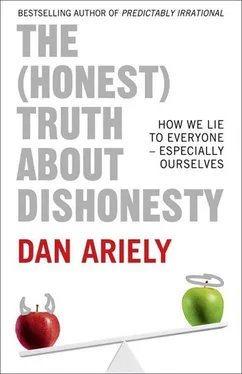Ariely, Dan - The (Honest) Truth About Dishonesty - How We Lie to Everyone – Especially Ourselves
Здесь есть возможность читать онлайн «Ariely, Dan - The (Honest) Truth About Dishonesty - How We Lie to Everyone – Especially Ourselves» весь текст электронной книги совершенно бесплатно (целиком полную версию без сокращений). В некоторых случаях можно слушать аудио, скачать через торрент в формате fb2 и присутствует краткое содержание. Жанр: Старинная литература, на английском языке. Описание произведения, (предисловие) а так же отзывы посетителей доступны на портале библиотеки ЛибКат.
- Название:The (Honest) Truth About Dishonesty: How We Lie to Everyone – Especially Ourselves
- Автор:
- Жанр:
- Год:неизвестен
- ISBN:нет данных
- Рейтинг книги:4 / 5. Голосов: 1
-
Избранное:Добавить в избранное
- Отзывы:
-
Ваша оценка:
- 80
- 1
- 2
- 3
- 4
- 5
The (Honest) Truth About Dishonesty: How We Lie to Everyone – Especially Ourselves: краткое содержание, описание и аннотация
Предлагаем к чтению аннотацию, описание, краткое содержание или предисловие (зависит от того, что написал сам автор книги «The (Honest) Truth About Dishonesty: How We Lie to Everyone – Especially Ourselves»). Если вы не нашли необходимую информацию о книге — напишите в комментариях, мы постараемся отыскать её.
The (Honest) Truth About Dishonesty: How We Lie to Everyone – Especially Ourselves — читать онлайн бесплатно полную книгу (весь текст) целиком
Ниже представлен текст книги, разбитый по страницам. Система сохранения места последней прочитанной страницы, позволяет с удобством читать онлайн бесплатно книгу «The (Honest) Truth About Dishonesty: How We Lie to Everyone – Especially Ourselves», без необходимости каждый раз заново искать на чём Вы остановились. Поставьте закладку, и сможете в любой момент перейти на страницу, на которой закончили чтение.
Интервал:
Закладка:
The innovation in this experiment was the “token” condition. The token condition was similar to the shredder condition, except that the participants were paid in plastic chips instead of dollars. In the token condition, once participants finished shredding their worksheets, they approached the experimenter and said, “I solved X matrices, please give me X tokens.” Once they received their chips, they walked twelve feet to a nearby table, where they handed in their tokens and received cold, hard cash.
As it turned out, those who lied for tokens that a few seconds later became money cheated by about twice as much as those who were lying directly for money. I have to confess that, although I had suspected that participants in the token condition would cheat more, I was surprised by the increase in cheating that came with being one small step removed from money. As it turns out, people are more apt to be dishonest in the presence of nonmonetary objects—such as pencils and tokens—than actual money.
From all the research I have done over the years, the idea that worries me the most is that the more cashless our society becomes, the more our moral compass slips. If being just one step removed from money can increase cheating to such a degree, just imagine what can happen as we become an increasingly cashless society. Could it be that stealing a credit card number is much less difficult from a moral perspective than stealing cash from someone’s wallet? Of course, digital money (such as a debit or credit card) has many advantages, but it might also separate us from the reality of our actions to some degree. If being one step removed from money liberates people from their moral shackles, what will happen as more and more banking is done online? What will happen to our personal and social morality as financial products become more obscure and less recognizably related to money (think, for example, about stock options, derivatives, and credit default swaps)?
Some Companies Already Know This!
As scientists, we took great care to carefully document, measure, and examine the influence of being one step removed from money. But I suspect that some companies intuitively understand this principle and use it to their advantage. Consider, for example, this letter that I received from a young consultant:
Dear Dr. Ariely,
I graduated a few years ago with a BA degree in Economics from a prestigious college and have been working at an economic consulting firm, which provides services to law firms.
The reason I decided to contact you is that I have been observing and participating in a very well documented phenomenon of overstating billable hours by economic consultants. To avoid sugar coating it, let’s call it cheating. From the most senior people all the way to the lowest analyst, the incentive structure for consultants encourages cheating: no one checks to see how much we bill for a given task; there are no clear guidelines as to what is acceptable; and if we have the lowest billability among fellow analysts, we are the most likely to get axed. These factors create the perfect environment for rampant cheating.
The lawyers themselves get a hefty cut of every hour we bill, so they don’t mind if we take longer to finish a project. While lawyers do have some incentive to keep costs down to avoid enraging clients, many of the analyses we perform are very difficult to evaluate. Lawyers know this and seem to use it to their advantage. In effect, we are cheating on their behalf; we get to keep our jobs and they get to keep an additional profit.
Here are some specific examples of how cheating is carried out in my company:
• A deadline was fast approaching and we were working extremely long hours. Budget didn’t seem to be an issue and when I asked how much of my day I should bill, my boss (a midlevel project manager) told me to take the total amount of time I was in the office and subtract two hours, one for lunch and one for dinner. I said that I had taken a number of other breaks while the server was running my programs and she said I could count that as a mental health break that would promote higher productivity later.
• A good friend of mine in the office adamantly refused to overbill and consequently had an overall billing rate that was about 20 percent lower than the average. I admire his honesty, but when it was time to lay people off, he was the first to go. What kind of message does that send to the rest of us?
• One person bills every hour he is monitoring his email for a project, whether or not he receives any work to do. He is “on-call,” he says.
• Another guy often works from home and seems to bill a lot, but when he is in the office he never seems to have any work to do.
These kinds of examples go on and on. There is no doubt that I am complicit in this behavior, but seeing it more clearly makes me want to fix the problems. Do you have any advice? What would you do in my situation?
Sincerely yours ,
Jonah
Unfortunately, the problems Jonah noted are commonplace, and they are a direct outcome of the way we think about our own morality. Here is another way to think about this issue: One morning I discovered that someone had broken the window of my car and stolen my portable GPS system. Certainly, I was very annoyed, but in terms of its economic impact on my financial future, this crime had a very small effect. On the other hand, think about how much my lawyers, stockbrokers, mutual fund managers, insurance agents, and others probably take from me (and all of us) over the years by slightly overcharging, adding hidden fees, and so on. Each of these actions by itself is probably not very financially significant, but together they add up to much more than a few navigation devices. At the same time, I suspect that unlike the person who took my GPS, those white-collar transgressors think of themselves as highly moral people because their actions are relatively small and, most important, several steps removed from my pocket.
The good news is that once we understand how our dishonesty increases when we are one or more steps removed from money, we can try to clarify and emphasize the links between our actions and the people they can affect. At the same time, we can try to shorten the distance between our actions and the money in question. By taking such steps, we can become more cognizant of the consequences of our actions and, with that awareness, increase our honesty.
LESSONS FROM LOCKSMITHS
Not too long ago, one of my students named Peter told me a story that captures our misguided efforts to decrease dishonesty rather nicely.
One day, Peter locked himself out of his house, so he called around to find a locksmith. It took him a while to find one who was certified by the city to unlock doors. The locksmith finally pulled up in his truck and picked the lock in about a minute.
“I was amazed at how quickly and easily this guy was able to open the door,” Peter told me. Then he passed on a little lesson in morality he learned from the locksmith that day.
In response to Peter’s amazement, the locksmith told Peter that locks are on doors only to keep honest people honest. “One percent of people will always be honest and never steal,” the locksmith said. “Another one percent will always be dishonest and always try to pick your lock and steal your television. And the rest will be honest as long as the conditions are right—but if they are tempted enough, they’ll be dishonest too. Locks won’t protect you from the thieves, who can get in your house if they really want to. They will only protect you from the mostly honest people who might be tempted to try your door if it had no lock.”
Читать дальшеИнтервал:
Закладка:
Похожие книги на «The (Honest) Truth About Dishonesty: How We Lie to Everyone – Especially Ourselves»
Представляем Вашему вниманию похожие книги на «The (Honest) Truth About Dishonesty: How We Lie to Everyone – Especially Ourselves» списком для выбора. Мы отобрали схожую по названию и смыслу литературу в надежде предоставить читателям больше вариантов отыскать новые, интересные, ещё непрочитанные произведения.
Обсуждение, отзывы о книге «The (Honest) Truth About Dishonesty: How We Lie to Everyone – Especially Ourselves» и просто собственные мнения читателей. Оставьте ваши комментарии, напишите, что Вы думаете о произведении, его смысле или главных героях. Укажите что конкретно понравилось, а что нет, и почему Вы так считаете.












